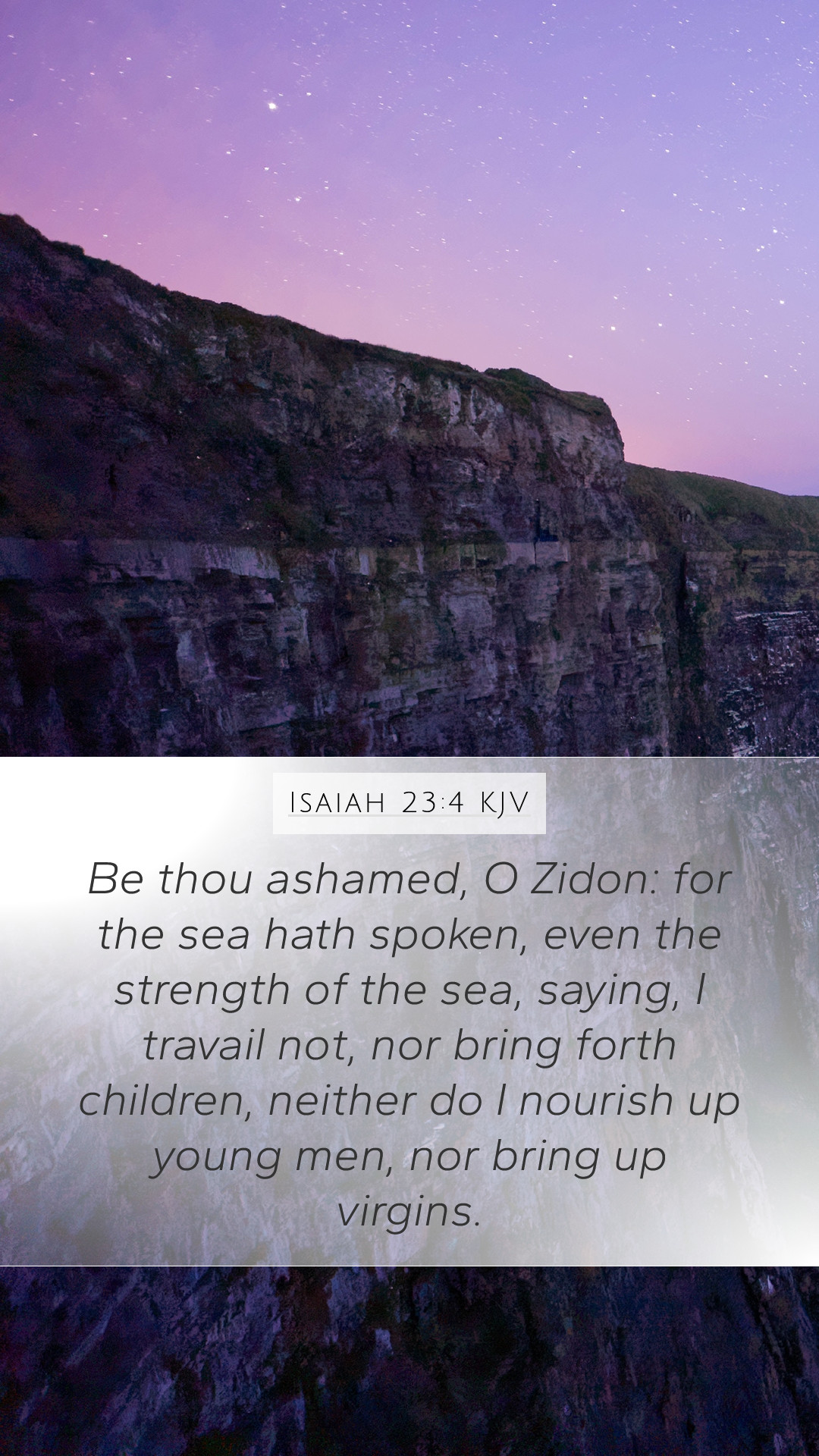Understanding Isaiah 23:4
Isaiah 23:4 states: "Be thou ashamed, O Zidon: for the sea hath spoken, even the strength of the sea, saying, I travail not, nor bring forth children." This verse carries significant weight in biblical prophecy and historical context, particularly concerning the city of Tyre and its surrounding region.
Bible Verse Meaning
The verse results from God's declaration regarding the fate of Tyre and Zidon, both prominent cities on the Phoenician coast. Isaiah, in this prophetic utterance, calls Zidon into accountability for its pride and spiritual decay. The use of the phrase "the strength of the sea" personifies the sea, suggesting that even nature weeps over the sin and eventual judgment faced by Zidon.
Bible Verse Interpretations
- Divine Judgment: Matthew Henry emphasizes that this passage showcases God's power in bringing judgment upon wicked cities. Zidon is chastised for its idolatry and failure to turn back to God.
- Symbolism of the Sea: Adam Clarke interprets the sea as symbolic of nations. Thus, the sea's lamentation can be understood as a metaphor for collective mourning among people affected by Zidon’s sins.
- Historical Context: Albert Barnes indicates that Tyre and Zidon were influential in trade and culture, yet their spiritual corruption led to their downfall. Their societal riches cannot save them from judgment.
Bible Verse Understanding
This verse invites readers to reflect on the seriousness of neglecting divine precepts, especially in prosperous conditions. The sea's declaration illustrates that even in the natural world, there is a acknowledgment of wrongdoing and impending doom.
Commentary Insights
The depth of this verse allows for multiple interpretations, which can provide rich Bible study insights. Here are some aspects emphasized in the commentaries:
- Pride and Shame: Zidon’s pride leads to its shame. Recognizing one’s sinful state is critical in the process of repentance.
- Futility of Wealth: No amount of worldly strength or wealth can protect against divine wrath - another point raised by Clarke.
- Call to Repentance: Zidon is called to recognize its faultiness and to seek restoration from God.
Bible Verse Explanations
Understanding Isaiah 23:4 enhances the reader's perception of how ancient prophecies can be relevant today. They teach valuable lessons about morality, integrity, and reliance on God over material strength.
In-Depth Scriptural Analysis
Exploring the historical relevance of Zidon, we see that this city was often associated with pagan worship and commerce, which drew the ire of the Hebrew prophets. The sermon in Isaiah reminds believers and non-believers alike to acknowledge their errors and to heed warnings of impending judgment.
Related Scriptures
- Jeremiah 25:22: Related in its condemnation of the nations.
- Ezekiel 26:15-21: A specific oracle against Tyre which delves deeper into the judgment theme.
- Isaiah 14:8: References how the pride of nations results in their eventual downfall.
Application of Isaiah 23:4
As one contemplates the verse, personal application might include recognizing one’s own pride and the need for humility before God. It serves as a reminder to seek a life aligned with divine principles, avoiding the path of Zidon, who would ultimately experience shame and loss.
Conclusion
Isaiah 23:4 not only illuminates the past but also offers timeless truths relevant today. As we delve into Bible study resources and engage in Bible study groups, we grow in understanding Scripture through careful Bible verse interpretations and Bible verse commentary that guide our spiritual journey.


